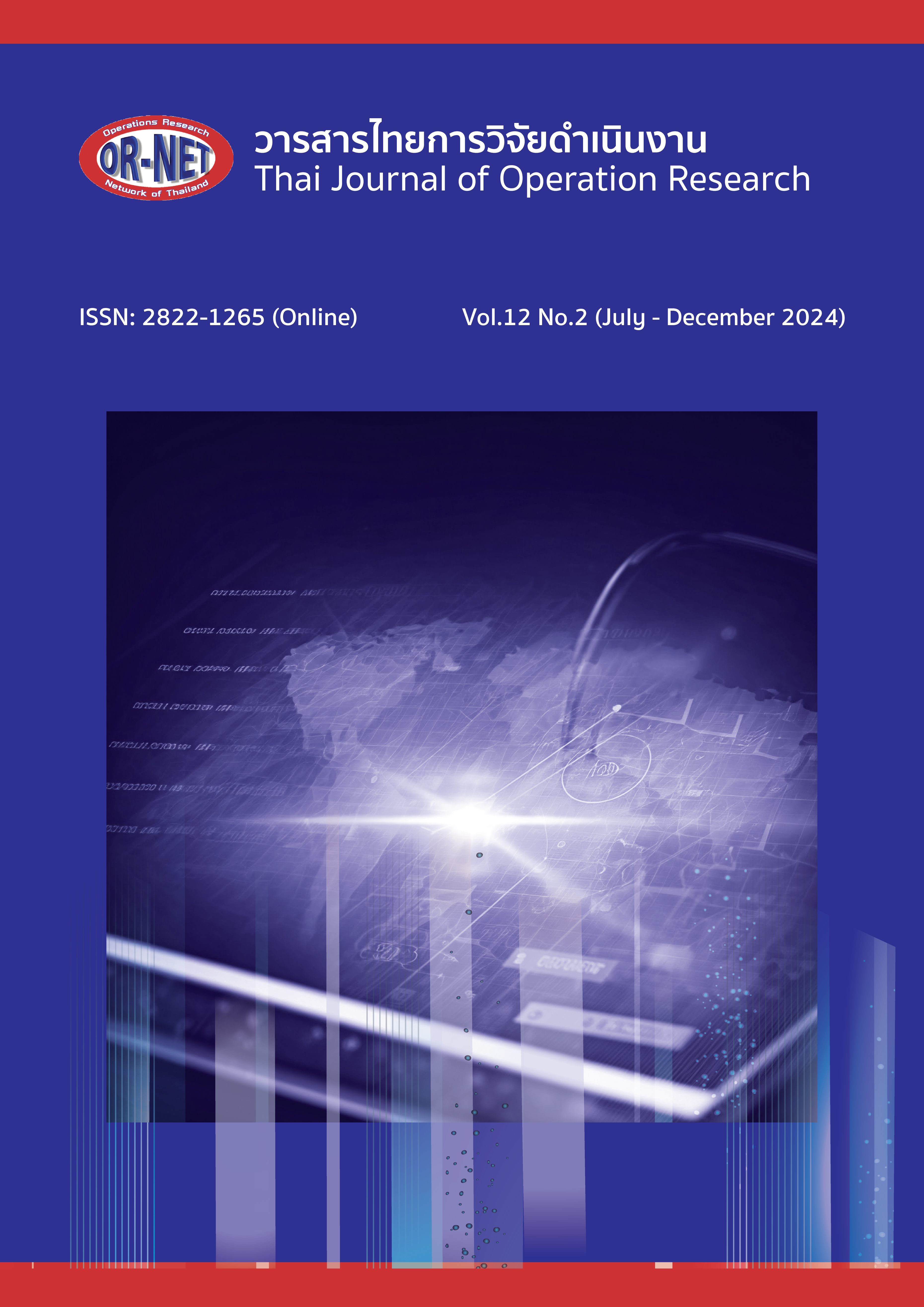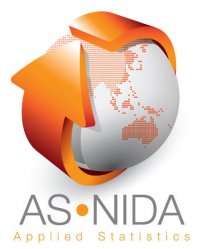Monthly Volumes of Water Inflow into the Large Dam Reservoirs in Eastern Thailand Forecasting by The Cuckoo Search Optimization Enhanced Decomposition and Holt-Winters Techniques
Keywords:
forecasting, dam reservoir, cuckoo search optimization, decomposition, Holt-WintersAbstract
This study aims to evaluate the efficiency of models through the integration of Cuckoo Search Optimization (CS) with Holt-Winters (CS-HW) and Decomposition (CS-D) for forecasting monthly inflow volumes into large dam reservoirs in Eastern Thailand, covering a total of 6 dams. This is compared with the Grid Search of Holt-Winters (Grid-HW) and the Classic Decomposition Model (Classic-D) using a training dataset spanning 66 months, and employing the Mean Absolute Error (MAE) as the criterion for the lowest MAE to assess model performance. The findings indicate that both CS-HW and CS-D models outperform traditional models, with CS-D demonstrating a significantly lower MAE than Classic-D, while CS-HW shows marginally lower MAE values than Grid-HW across all dams.
For the long-term forecasting of dam reservoir inflow volumes over a 24-month horizon using a test dataset, criteria including Root Mean Square Error (RMSE), MAE, and Symmetric Mean Absolute Percentage Error (sMAPE) were utilized to evaluate model performance. The results show that for different dams, specific models were chosen as best fitting: Khun Dan Prakan Chon Dam selected the CS with Additive Holt-Winters (CS-HW+), Khlong Siyat chose the CS with Multiplicative Holt-Winters (CS-HWx), Naruebodindrashinta Dam opted for the Box-Jenkins model, Bang Phra Dam for the CS with Multiplicative Decomposition (CS-Dx), Prasae Dam for the Grid Search of Multiplicative Holt-Winters (Grid-HWx), and Nong Pla Lai for the Grid Search of Additive Holt-Winters (Grid-HW+). The outcome of the 24-month forecasting demonstrates clear seasonal patterns in the reservoir inflow volumes to the dams.
References
M. Dorigo, “Optimization, learning and natural algorithms,” Ph.D. thesis, Politecnico di Milano, Italy, 1992.
M. Dorigo, M. Birattari and T. Stutzle, “Ant colony optimization,” IEEE Comput Intell., vol. 1, no. 4, pp. 28–39, 2006.
J. Kennedy and R. Eberhart, “Particle Swarm Optimization,” in Proceedings of the 1995 IEEE International Conference on Neural Networks, Perth, WA, Australia, pp. 1942–1948, 1995.
H. A. Abbass, “MBO: Marriage in Honey Bees Optimization – a Haplometrosis Polygynous Swarming Approach,” in Proceedings of The 2001 Congress on Evolutionary Computation, Seoul, Korea (South), pp. 207–214, 2001.
X. Li, “A new intelligent optimization-artificial fish swarm algorithm,” PhD thesis, Zhejiang University of Zhejiang, China, 2003.
R. Martin and W. Stephen, “Termite: A Swarm Intelligent Routing Algorithm for Mobilewireless Ad-Hoc Networks,” in Stigmergic Optimization, Studies in Computational Intelligence, Springer, Berlin, Heidelberg, 2006, pp. 155–184.
B. Basturk and D. Karaboga, “An Artificial Bee Colony (ABC) Algorithm for Numeric Function Optimization,” in Proceedings of the IEEE Swarm Intelligence Symposium, Indianapolis, USA, pp. 12–14, 2006.
P. C. Pinto, T. A. Runkler and J.M. Sousa, “Wasp Swarm Algorithm for Dynamic MAXSAT problems,” in Adaptive and Natural Computing Algorithms, Springer, Berlin, Heidelberg, 2007, pp. 350–357.
A. Mucherino and O. Seref, “Monkey Search: A Novel Metaheuristic Search for Global Optimization,” in AIP Conference on Data Mining, Systems Analysis and Optimization in Biomedicine, Gainesville, 2007.
C. Yang, X. Tu and J. Chen, Algorithm of Marriage in Honey Bees Optimization Based on The Wolf Pack Search, in Proceedings of The 2007 International Conference on Intelligent Pervasive Computing (IPC 2007), Jeju, Korea (South), pp. 462–467, 2007.
X. Lu and Y. Zhou, “A Novel Global Convergence Algorithm: Bee Collecting Pollen Algorithm, in Advanced Intelligent Computing Theories and Applications With Aspects of Artificial Intelligence, Springer, Berlin, Heidelberg, 2008, pp. 518–525.
Y. Shiqin, J. Jianjun and Y. Guangxing, “A Dolphin Partner Optimization,” in Proceedings Of The WRI Global Congress on Intelligent Systems, Xiamen, China, pp. 124–128, 2009.
X. S. Yang and S. Deb, “Cuckoo Search Via Lévy Flights,” in Proceedings of The World Congress on Nature & Biologically Inspired Computing (NaBIC), Coimbatore, India, pp. 210–214, 2009.
J. Sun, B. Feng and W. Xu, “Particle Swarm Optimization With Particles Having Quantum Behavior,” in Proceedings of the 2004 Congress on Evolutionary Computation (IEEE Cat. No.04TH8753), Portland, OR, USA. pp. 325-331, 2004.
C. T. Cheng, W. J. Niu, Z. K. Feng, J. J. Shen and K. W. Chau, “Daily reservoir runoff forecasting method using artificial neural network based on quantum-behaved particle swarm optimization,” Water., vol. 7, no. 8, pp. 4232-4246, 2015.
W. J. Niu, Z. K. Feng, C. T. Cheng and J. Z. Zhou, “Forecasting daily runoff by extreme learning machine based on quantum-behaved particle swarm optimization,” Journal of Hydrologic Engineering., vol. 23, no. 3, pp. 04018002, 2018.
Z. K. Feng, W. J. Niu, Z. Y. Tang, Z. Q. Jiang, Y. Xu, Y. Liu and H. R. Zhang, “Monthly runoff time series prediction by variational mode decomposition and support vector machine based on quantum-behaved particle swarm optimization,” Journal of Hydrology., vol. 583, no. 6, pp. 1-12, 2020.
E. Hadavandi, A. Ghanbari and S. Abbasian-Naghneh, “Developing a Time Series Model Based on Particle Swarm Optimization for Gold Price Forecasting,” in Third International Conference on Business Intelligence and Financial Engineering, Hong Kong, China. pp. 337-340, 2010.
S. Kaewpaengjuntra, S. Somhom and L. Saenchan, “Electricity consumption forecasting model using hybrid Holt-Winters exponential smoothing and artificial bee colony algorithm,” Information Technology Journal., vol. 6, no. 1, pp. 12-17, 2010.
M. V. O. Assis, L. F. Carvalho, J. J. P. C. Rodrigues and M.L. Provençal, “Holt-Winters Statistical Forecasting and ACO Metaheuristic for Traffic Characterization,” in Proceeding of 2013 IEEE International Conference on Communications (ICC), Budapest, Hungary, pp. 2524-2528. 2013.
A. Simoni, E. D. Gjika and L. Puka, “Evolutionary Algorithm PSO and Holt-Winters Method Applied in Hydro Power Plants Optimization,” in Proceeding of the SPNA -Statistics Probability and Numerical Analysis, Tirana, Albania, pp. 7-20, 2015.
W. Minsan and P. Minsan, “Incorporating decomposition and the Holt-Winters method into the whale optimization algorithm for forecasting monthly government revenue in Thailand,” Science & Technology Asia., vol. 28, no. 4, pp. 38-53, 2023.
W. Minsan and P. Minsan, “Decomposition and Holt-Winters enhanced by the whale optimization algorithm for forecasting the amount of water inflow into the large dam reservoirs in southern Thailand,” Journal of Current Science and Technology., vol. 14, no. 2, pp. 1-16, 2024.
C. C. Mauricio and C. F. Ostia, “Cuckoo Search Algorithm Optimization of Holt-Winter Method for Distribution Transformer Load Forecasting,” in Proceeding of the 2023 9th International Conference on Control, Automation and Robotics (ICCAR), Beijing, China, pp. 36-42, 2023.
X. S. Yang, Nature-Inspired Optimization Algorithms, London: Elsevier, 2014.
R. N. Mantegna, “Fast, accurate algorithm for numerical simulation of Lévy stable stochastic process,” Phys Rev E., vol. 49, no. 5, pp. 4677-4683, 1994.
Royal Irrigation Department, Ministry of Agriculture and Cooperatives, “Reservoirs Nationwide,” [Online]. Available: https://app.rid.go.th/reservoir/rsvmiddle. [Accessed 26 January 2024].
R. J. Hyndman and A. B. Koehler, “Another look at measures of forecast accuracy,” International Journal of Forecasting., vol. 22, no. 4, pp. 679-688, 2006.
G. E. P. Box, G. M. Jenkins, G. C. Reinsel and G. M. Ljung, Time Series Analysis: Forecasting and Control, 5th ed., Oxford, England: John Wiley & Sons, 2015.
S. Hochreiter and J. Schmidhuber, “Long short-term memory,” Neural Computation., vol. 9, no. 8, pp. 1735-1780, 1997.
“Google Colab, Overview of Colaboratory Features,” [Online]. Available: https://colab.research.google.com/notebooks/intro.ipynb. [Accessed 1 February 2024].
Downloads
Published
How to Cite
Issue
Section
License

This work is licensed under a Creative Commons Attribution-NonCommercial-NoDerivatives 4.0 International License.




